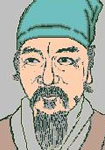“馬蹄初趁輕裝”的意思及全詩出處和翻譯賞析
“馬蹄初趁輕裝”全詩
都城漸遠,芳樹隱斜陽。
未慣羈游況味,征鞍上、滿目凄涼。
今宵里,三更皓月,愁斷九回腸。
佳人,何處去,別時無計,同引離觴。
但唯有相思,兩處難忘。
去即十分去也,如何向、千種思量。
凝眸處,黃昏畫角,天遠路岐長。
分類: 滿庭芳
作者簡介(周邦彥)

周邦彥(1056年-1121年),中國北宋末期著名的詞人,字美成,號清真居士,漢族,錢塘(今浙江杭州)人。歷官太學正、廬州教授、知溧水縣等。徽宗時為徽猷閣待制,提舉大晟府。精通音律,曾創作不少新詞調。作品多寫閨情、羈旅,也有詠物之作。格律謹嚴。語言典麗精雅。長調尤善鋪敘。為后來格律派詞人所宗。舊時詞論稱他為“詞家之冠”。有《清真集》傳世。
《滿庭芳》周邦彥 翻譯、賞析和詩意
《滿庭芳》是一首宋代詩詞,作者是周邦彥。以下是我為您提供的詩詞的中文譯文、詩意和賞析:
滿庭芳
花撲鞭梢,風吹衫袖,
馬蹄初趁輕裝。
都城漸遠,芳樹隱斜陽。
未慣羈游況味,征鞍上、滿目凄涼。
今宵里,三更皓月,愁斷九回腸。
佳人,何處去,別時無計,同引離觴。
但唯有相思,兩處難忘。
去即十分去也,如何向、千種思量。
凝眸處,黃昏畫角,天遠路岐長。
中文譯文:
滿庭芳
花兒拂打著鞭梢,風輕拂著衣袖,
馬蹄初次踏上輕裝。
都城漸漸遠去,芳樹隱藏在斜陽中。
還未習慣漂泊的滋味,坐在征鞍上,滿眼凄涼。
今宵之夜,月色皎潔,愁緒糾纏著九回腸。
佳人啊,你去了何方,分別時無法預料,與我一同引離酒。
只有相思始終存在,兩地難以忘懷。
離去就是徹底離去,如何面對,千般思緒紛亂。
凝視的地方,黃昏中畫角婉轉,天空遼遠,道路曲折無窮。
詩意和賞析:
《滿庭芳》描述了離別后的思念之情。詩中通過描寫花兒拍打著鞭梢、風輕拂著衣袖的場景,以及馬蹄初次踏上輕裝的情景,表現了主人公離開都城、遠離親人和家鄉的心境。詩人用“芳樹隱斜陽”來形容離別的傷感和無奈,同時表達了對陌生環境的不適應和孤寂的感覺。
詩人借用夜晚皓月的明亮和幽寂,以及愁緒糾纏九回腸的描述,強調了離別帶來的深深思念之情。詩中的佳人象征著離別的愛人,作者對她的思念如影隨形,無法忘懷。詩人表示,盡管分別已經發生,但兩地的思念卻無法割舍。
最后兩句“去即十分去也,如何向、千種思量。凝眸處,黃昏畫角,天遠路岐長。”表達了作者對離別的無奈和思考。離別既是徹底的離去,作者不知如何應對,思緒紛亂。黃昏中吹奏著畫角,表明時間的流逝和道路的曲折無定,似乎增添了作者情感的迷茫和無助。
整首詩詞以離別情思為主題,通過描繪離別的場景和表達內心的思念之情,抒發了作者對離別的痛苦和對遠方愛人的深深思念之情,展現了宋代文人的憂愁和離《滿庭芳》 is a poem from the Song Dynasty written by Zhou Bangyan. Here is the Chinese translation, the poetic meaning, and an analysis of the poem:
滿庭芳
花撲鞭梢,風吹衫袖,
馬蹄初趁輕裝。
都城漸遠,芳樹隱斜陽。
未慣羈游況味,征鞍上、滿目凄涼。
今宵里,三更皓月,愁斷九回腸。
佳人,何處去,別時無計,同引離觴。
但唯有相思,兩處難忘。
去即十分去也,如何向、千種思量。
凝眸處,黃昏畫角,天遠路岐長。
Chinese Translation:
滿庭芳
花朵拍打著鞭梢,風吹拂衣袖,
馬蹄初次邁上輕裝。
都城漸漸遠去,芳樹隱匿在斜陽中。
未曾習慣漂泊的滋味,征鞍之上,眼前盡是凄涼景象。
今宵之夜,月色皎潔,愁緒擾亂九次腸。
佳人啊,你去了何方,離別時無法預料,共同引離酒杯。
唯有相思依舊,兩地難忘。
離去即徹底離去,如何面對,千般思量。
凝視之處,黃昏中響起畫角悠揚,天空遙遠,道路迢迢。
Poetic Meaning and Analysis:
"滿庭芳" depicts the feeling of longing after parting ways. The poem begins by describing flowers brushing against the whip's end and the wind gently touching the sleeves of the robe. It portrays the protagonist's departure from the capital city, leaving behind loved ones and hometown. The poet uses the phrase "芳樹隱斜陽" to convey the sadness and helplessness of parting, as well as the protagonist's unfamiliarity with the wandering life depicted through the desolation seen from the saddle.
The poet emphasizes the deep longing brought by separation through the imagery of the moonlit night and the troubled emotions occupying the protagonist's mind. The "佳人" (beloved) in the poem symbolizes the departed lover, and the poet's longing for her remains unwavering. Despite their physical separation, the poet finds it impossible to forget their memories and longing for each other.
The final two lines, "去即十分去也,如何向、千種思量。凝眸處,黃昏畫角,天遠路岐長。" express the poet's helplessness and contemplation towards the separation. Departure signifies a complete parting, leaving the poet unsure of how to cope with the myriad of thoughts and emotions. The sound of the horn in the twilight signifies the passage of time and the uncertain path ahead, adding to the poet's sense of confusion and helplessness.
The poem "滿庭芳" revolves around the theme of separation and longing. By depicting scenes of departure and expressing inner longing, the poet conveys the pain of parting and the deep longing for a distant lover, reflecting the melancholy and detachment commonly found in literati of the Song Dynasty.
“馬蹄初趁輕裝”全詩拼音讀音對照參考
mǎn tíng fāng
滿庭芳
huā pū biān shāo, fēng chuī shān xiù, mǎ tí chū chèn qīng zhuāng.
花撲鞭梢,風吹衫袖,馬蹄初趁輕裝。
dū chéng jiàn yuǎn, fāng shù yǐn xié yáng.
都城漸遠,芳樹隱斜陽。
wèi guàn jī yóu kuàng wèi, zhēng ān shàng mǎn mù qī liáng.
未慣羈游況味,征鞍上、滿目凄涼。
jīn xiāo lǐ, sān gēng hào yuè, chóu duàn jiǔ huí cháng.
今宵里,三更皓月,愁斷九回腸。
jiā rén, hé chǔ qù, bié shí wú jì, tóng yǐn lí shāng.
佳人,何處去,別時無計,同引離觴。
dàn wéi yǒu xiāng sī, liǎng chù nán wàng.
但唯有相思,兩處難忘。
qù jí shí fēn qù yě, rú hé xiàng qiān zhǒng sī liang.
去即十分去也,如何向、千種思量。
níng móu chù, huáng hūn huà jiǎo, tiān yuǎn lù qí zhǎng.
凝眸處,黃昏畫角,天遠路岐長。
“馬蹄初趁輕裝”平仄韻腳
平仄:仄平平仄平平
韻腳:(平韻) 下平七陽 * 平仄拼音來自網絡,僅供參考;詩句韻腳有多個的時候,對比全詩即可判斷。